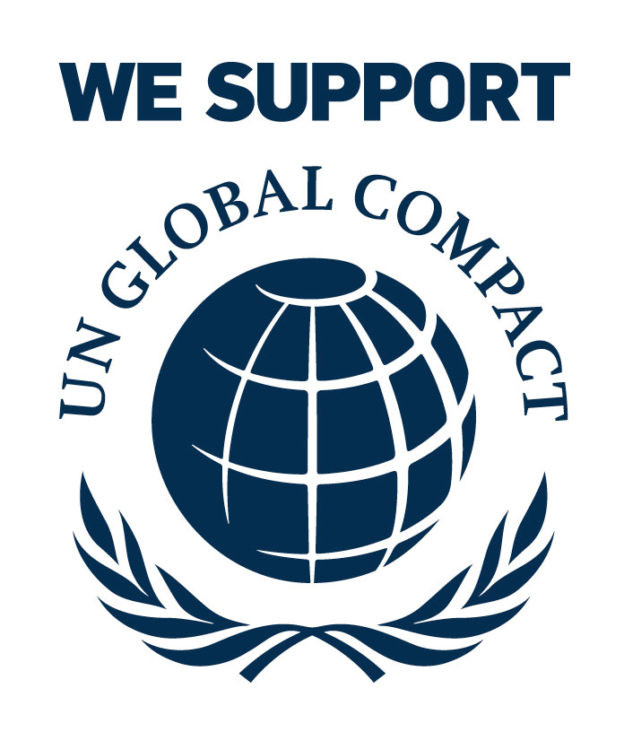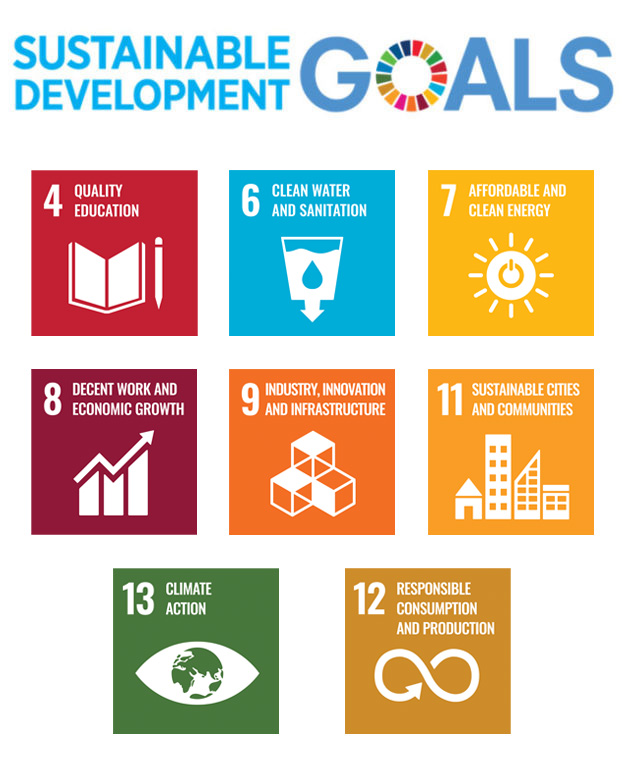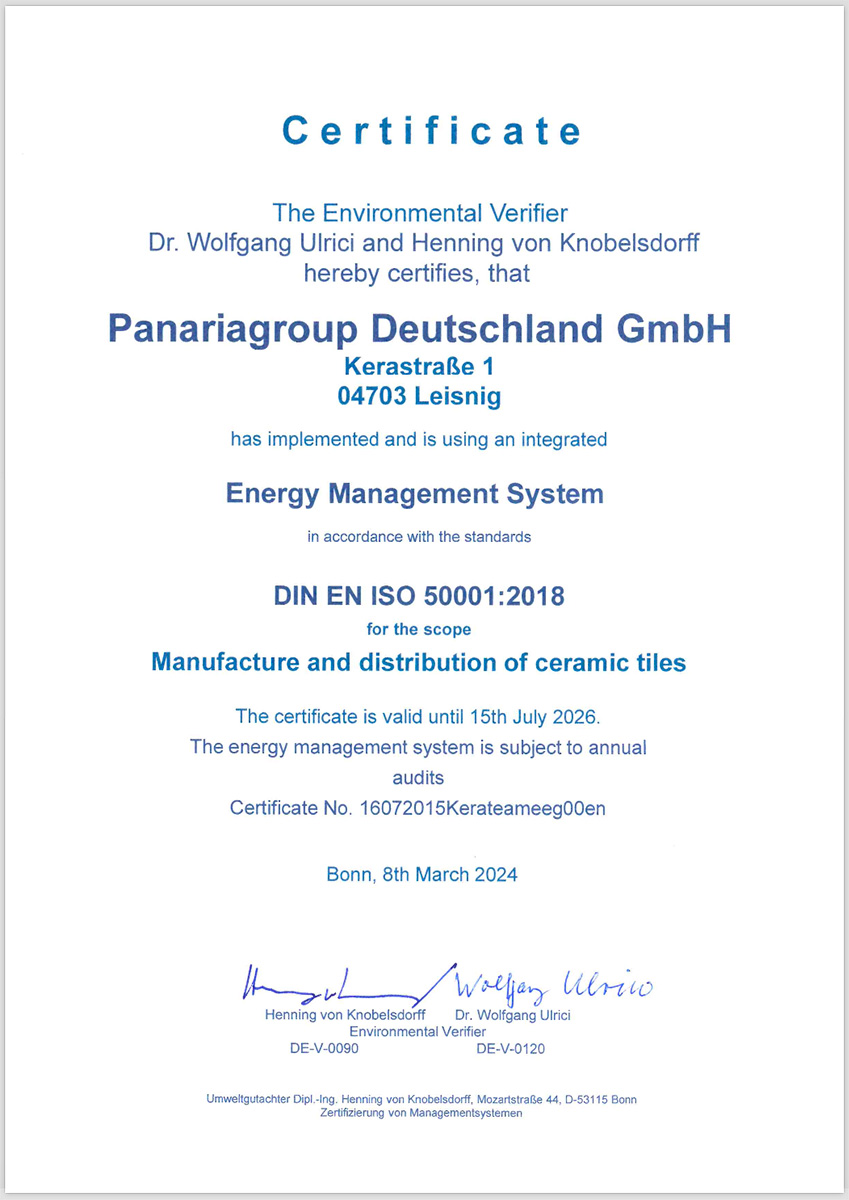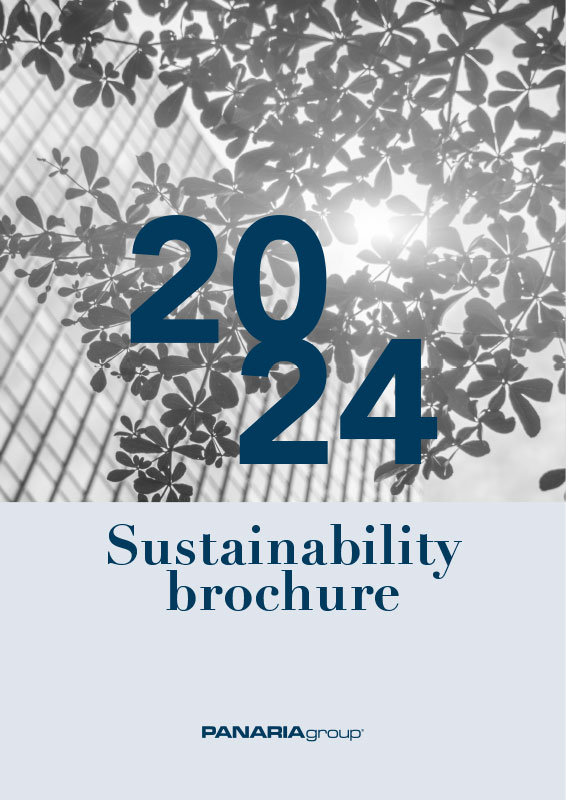SUSTAINABILITY AND RESPONSIBILITY
of Panariagroup Deutschland GmbH.
Panariagroup’s mission statement is about growing and creating well-being in harmony with the people and the environment, with openness, passion and love for our work. In order to achieve such targets, the Group aims to generate sustainable value for its shareholders, employees and business partners respecting society and the environment. The Group has a strong focus on research and innovation, and is resolute to satisfy the highest expectations in the fields of general well-being and of aesthetics, both for professional and private customers, in architecture or in the construction industry.

Our Commitment

Support for innovation
We have invested around 105 million euros in innovation over the last 5 years.

Energy saving
Our energy consumption index is 0.137 GJ per m2 of tiles, using increasingly more renewable energy.

Emission reduction
9 t CO2 for 1,000 m2 of tiles, 121 t CO2 avoided over the course of the year.

Attention to wast and water consumption
We recovered more than 70,000 tons of production waste and 430,000 m3 of water.

Waste management
98% of waste is destined for recovery.

Eco-friendly packaging
We bought more than 650 tons of recycled plastic for industrial use.

Low water impact
Water consumption intensity 0.02 m3 per m2 of tiles.

Human resources
97% of our employees have a permanent contract.

Close relationship wiht the local area
More than 90% of our expenditure is made on local suppliers.

Products for quality of life
We offered our clients a wide range of eco-friendly ceramic slabs (70 collections) and antibacterial surfaces (98 collections).
Download sustainability report
of Panariagroup
We support UN GLOBAL COMPACT
Panariagroup joins the UN Global Compact. This is the largest corporate sustainability initiative worldwide and was set up by the United Nations. There are now over 21.000 companies participating in 164 countries.
The UN Global Compact encourages its private sector participants to adopt policies in four fundamental areas:
- respect for human rights
- fair labour standards
- environmental sustainability
- fight against corruption
These translate into ten principles that member companies must adopt and respect in their approach to business, so that the ethics and values become an integral part of their strategies and operations, in full compliance with the principles of Corporate Social Responsibility.
Panariagroup, by adhering to the UN Global Compact, is committed to these fundamental rules and is open to comparison on decisive issues at the international level, while confirming their central role in the company’s development policies.

Our commitment to people and the planet
The Sustainable Development Goals – SDGs – are a set of 17 goals defined within the United Nations with the aim of guiding Countries and organizations around the world on a path towards reducing inequality, promoting economic prosperity and social development, and protecting the environment. Each goal includes 169 specific targets and together they make up the core elements of the 2030 Agenda for Sustainable Development. We have aligned ourselves and identified the most significant SDGs in relation to the impact we generate on the local area.

Leisnig plant - Energy management system
Certificate DIN EN ISO 50001:2018

Certificate energy management system
DIN EN ISO 50001:2018
Download certificat (PDF, english, 0.3 mb)
Leisnig plant - Energy management system
Certificate DIN EN ISO 50001:2018

Certificate energy management system
DIN EN ISO 50001:2018
Download certificat (PDF, english, 0.3 mb)
The tile: ecological and sustainable quality
In addition to tiles, parquet, laminate and carpets, vinyl floor coverings in particular are currently enjoying great popularity. The reason is the price and the supposedly simple installation. Doing it yourself has become a trend, which means that building owners are increasingly taking things into their own hands. What used to be primarily a phenomenon in the field of fashion is now spilling over into other areas such as the construction sector: it has to be cheap. When the emphasis is on lower priced floor coverings, some important aspects are often neglected, and these include not only the quality of the materials but also potential health risks.
Although new-generation plastic floorings no longer have harmful phthalate-containing plasticisers, the long-term effects of the alternative, supposedly harmless, plasticisers are not yet known. This is, among other things, because the amount of substances absorbed by the air steadily increases.
For anyone who wants to live in a healthy and environmentally friendly way, ceramic tiles are the ideal choice. Conservation of resources and environmental protection are top priorities for the tile – from the raw material extraction to the recycling process. Also in terms of durability and ease of care, ceramic tiles are always the superior solution, providing a combination of benefits not found in any other floor covering.
- Robust, resilient and long-lasting. While other floor coverings can scratch easily, tiles last practically forever.
- Very easy to care for and clean.
- Ecological, because they are produced from natural raw materials.
- Free from harmful substances. Ceramic tiles do not emit any substances that are hazardous to the environment or health and are neutral to ambient air.
- Ideal for allergy sufferers, because, unlike, for example, carpeting, no mites or pathogens can form.
- UV-resistant: they do not fade and become brittle. This is a clear advantage over wooden flooring.
- Antistatic. Unlike many other floor coverings, they do not become electrically charged when walked upon or subject to friction.
- Heat-retaining and -conductive. For an efficient use of underfloor heating, there is practically no better floor covering than tiles – which have an excellent thermal conductivity.
- Heat resistant and waterproof. In the case of fire, there are no toxic gases and the inseparability of the tiles often protects the substructure from being destroyed.
- The ideal option for passive air-conditioning in summer. In winter, tiles store the incoming heat from the sun.
- Recyclable. Any fragments are returned to the production cycle as recycled products.
- Slip-resistant, frost-resistant and offering flexibility in design thanks to the numerous colours and formats.
Even before a tile is created, close attention is paid to the ecological compatibility. This begins with the processing of natural, locally sourced raw materials such as clay, kaolin, quartz and feldspar. In the production itself, the fresh water used is not taken from the mains drinking water supply, but from the facility’s own wells. Afterwards, the water is recycled and reused. Emissions from the firing process are below the strict limits of the German Clean Air Act (TA-Luft) thanks to the use of state-of-the-art, efficient emission purification systems. The environmental protection measures are thus geared to the lowest possible energy consumption and low-emission exhaust air. During the production process, no hazardous waste is produced. A large proportion of the broken tile fragments are returned to the production cycle, forming the raw material for new tiles. The small amount left over is used as a soil substitute (for example for road construction) or as a raw material for other industries.
If it is ever planned to replace the tile flooring, the possibilities are endless. Depending on the quantity and material, the tiles can be reused during the purposeful dismantling of a building. During renovations they can often remain on the floor or wall and a new surface can be applied to them – something that is not possible when other flooring materials such as carpeting have been used. If these recycling options are out of the question, the tiles that remain on the construction site are easy to dispose of and are not a burden to the environment.
Our recommendation: do not to be blinded by advertising slogans and cheap floor coverings, but get more information and pay increased attention to ecologically sound building materials that ensure a healthy living environment.
